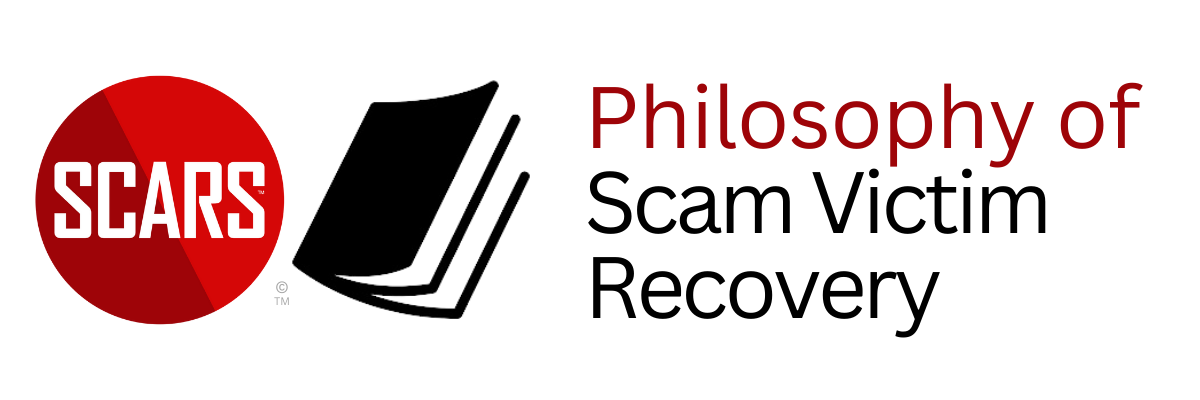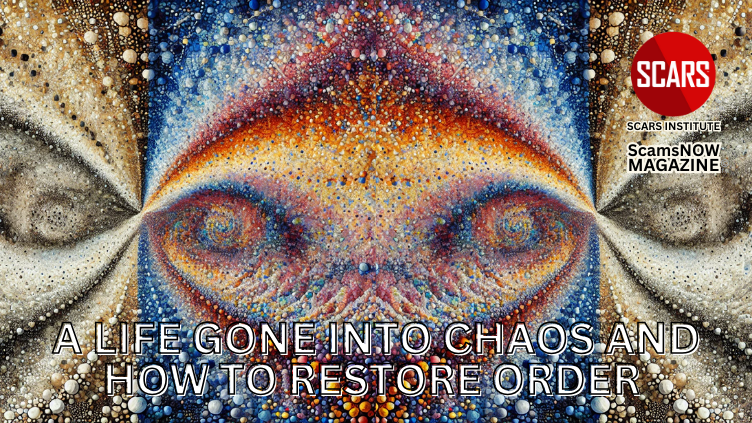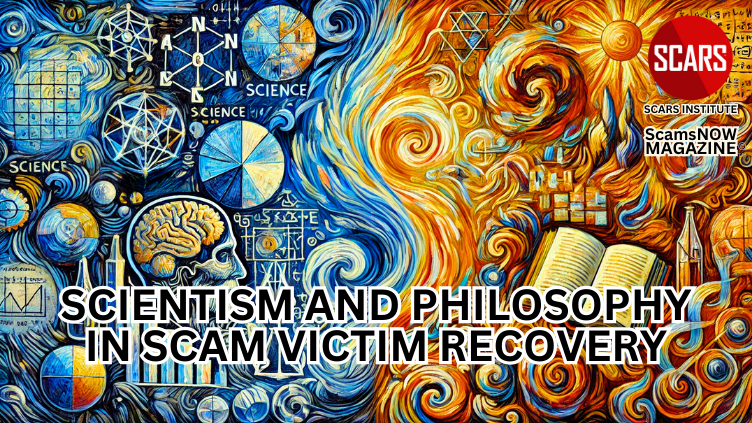Scientism and Philosophy in Scam Victim Recovery
The Limits of Scientism & Philosophy in Scam Victim Recovery: Why Neither Science Nor Philosophy Alone Cannot Heal Trauma Completely
Primary Category: Scam Victim Recovery Philosophy
Intended Audience: Scam Victims-Survivors / Family & Friends
Author:
• Tim McGuinness, Ph.D., DFin, MCPO, MAnth – Anthropologist, Scientist, Polymath, Director of the Society of Citizens Against Relationship Scams Inc.
About This Article
Scam victim recovery requires more than just scientific understanding; it demands a deeper philosophical approach to healing. While neuroscience and psychology explain how manipulation works and how trauma affects the brain, they do not provide the meaning, purpose, or ethical guidance needed for long-term recovery. Philosophical traditions, especially those from Eastern and Western thought, help victims find resilience, acceptance, and self-forgiveness.
Scientism, which prioritizes empirical knowledge over personal and moral reflection, can overlook the deeply human need for purpose and trust after betrayal. True healing integrates both science and philosophy—using scientific insights to understand trauma while relying on philosophy to provide the meaning and motivation to rebuild one’s life. By combining these approaches, victims can move beyond survival and into personal transformation.

The Limits of Scientism & Philosophy in Scam Victim Recovery: Why Neither Science Nor Philosophy Alone Cannot Heal Trauma Completely
Scam victim recovery is an intricate process involving deep psychological wounds, emotional trauma, and long-term cognitive rehabilitation. While neuroscience and psychology provide invaluable insights into how manipulation works and how trauma impacts the brain, these scientific approaches alone are not sufficient to fully guide someone through the healing process. Recovery is not just a mechanical process of brain chemistry and behavioral conditioning—it is also a journey of meaning, self-discovery, and moral restoration. This is where philosophy, faith, and other humanities-based approaches become essential.
Scientism—the overreliance on scientific methods as the sole or ultimate source of knowledge—can hinder effective recovery by reducing complex human experiences to purely biological or psychological processes. While science helps us understand the mechanics of trauma and deception, it does not address the deeper questions of why recovery matters, how to rebuild a shattered sense of self, or what purpose victims should find in moving forward.
Part 1: Scientism & Philosophy
What is Scientism?
Scientism is the belief that science is the ultimate or exclusive source of knowledge and understanding, often to the exclusion of other disciplines such as philosophy, religion, or the humanities. It is characterized by an overreliance on scientific methods and empirical evidence as the only valid way to determine truth, sometimes dismissing other forms of knowledge as unscientific or irrelevant.
There are two main forms of scientism:
Epistemological Scientism – The belief that science is the only legitimate or superior way to acquire knowledge. This view often disregards insights from ethics, metaphysics, theology, or subjective human experiences as either invalid or of lesser importance.
Methodological Scientism – The idea that scientific methods should be applied universally, even in domains where they may not be appropriate, such as moral reasoning, political philosophy, or aesthetics.
Critics argue that scientism leads to intellectual reductionism, where complex human experiences and cultural phenomena are oversimplified through purely scientific explanations. It can also foster arrogance in dismissing disciplines that rely on logic, introspection, historical context, or qualitative analysis. While science is a powerful tool for understanding the natural world, critics of scientism emphasize the importance of a broader epistemological approach that includes philosophy, art, and human intuition.
The Role of Science in Understanding Scam Victimization
Scientific disciplines such as neuroscience, cognitive psychology, and behavioral economics offer valuable explanations for how scams manipulate victims and why recovery is so difficult. These fields provide empirical insights into:
Neural Responses to Manipulation: Research shows that scams exploit the brain’s reward systems, creating dopamine-driven reinforcement cycles that trap victims in harmful relationships or fraudulent schemes.
Cognitive Biases in Decision-Making: Studies in psychology demonstrate how social engineering exploits biases like trust heuristics, sunk cost fallacy, and authority bias, making victims more susceptible to deception.
The Neurology of Trauma: MRI scans and neurochemical studies have revealed how trauma from scams can alter brain function, leading to PTSD-like symptoms, anxiety, and difficulty trusting again.
The Psychology of Denial: Research in behavioral psychology explains why victims struggle to accept that they were deceived, a phenomenon driven by cognitive dissonance and opponent processing.
These insights are critical in identifying how victims fall into scams and why they may struggle with recovery. However, science stops short of providing meaningful guidance on how to rebuild a sense of self after being scammed or why victims should keep pushing forward when the emotional toll feels unbearable.
Where Science Fails: The Need for Meaning in Recovery
While science can analyze the mechanics of trauma, it cannot offer meaning to those who have lost their sense of identity, financial stability, or faith in humanity. Scam victims often experience existential crises, asking questions that science alone cannot answer:
- Why did this happen to me?
- Am I still worthy of respect and love?
- How do I rebuild my life when everything I trusted was a lie?
- Is there a purpose to this suffering?
These are not scientific questions; they are philosophical ones. A person’s sense of identity and worth cannot be restored solely by knowing which neurotransmitters were involved in their trauma. Instead, they need frameworks of thought that provide meaning, hope, and moral guidance.
The Role of Philosophy in Scam Victim Recovery
Philosophy offers something that neuroscience and psychology cannot: a way to interpret suffering and turn it into personal growth. Scam victims are often plagued by shame, self-doubt, and a deep sense of loss. While therapy can help manage symptoms of depression and anxiety, philosophy helps answer deeper existential questions:
Moral Philosophy and Self-Forgiveness: Victims often feel responsible for their own deception, leading to deep shame. Philosophical traditions such as Stoicism and existentialism provide frameworks for understanding human fallibility, self-compassion, and the ability to move forward without self-condemnation.
The Search for Meaning: Existentialist thinkers like Viktor Frankl, who survived the Holocaust and wrote Man’s Search for Meaning, argue that suffering only becomes bearable when it is given meaning. Scam victims who find a reason to move forward—whether through helping others, rebuilding relationships, or personal growth—are more likely to recover.
Faith and Ethical Reconstruction: Many victims experience a crisis of trust—not just in individuals, but in society as a whole. Whether through faith-based perspectives or secular moral philosophy, victims need ethical grounding to believe in goodness again. A purely scientific approach to recovery does not offer moral renewal; philosophy and faith do.
Long-Term Motivation and Endurance: Science may provide a roadmap for behavioral change, but philosophy provides the why—the purpose and motivation needed to sustain recovery for years. Healing is not a quick process; it often takes years of rebuilding self-trust and emotional resilience. Without deeper motivation, many victims feel hopeless and abandon their recovery journey.
How Scientism Ignores Our Humanity
Scientism, when applied too rigidly, disregards the emotional, moral, and philosophical dimensions of healing. It treats scam victim recovery as a technical process—one where the right combination of therapy, medication, and behavioral conditioning should “fix” the problem. However, this perspective overlooks the very things that make us human:
The Need for Purpose: People are not machines that can simply be reprogrammed after trauma. They need meaning in their struggles, something scientism cannot provide.
The Role of Faith and Morality: Whether religious or secular, ethical and moral systems shape how victims see themselves after being scammed. Scientism often dismisses these as “irrational,” despite their proven importance in psychological resilience.
The Subjectivity of Human Experience: Each scam victim’s journey is deeply personal. While science looks for universal patterns, philosophy recognizes the unique struggles of individuals and helps them make sense of their personal stories.
A Holistic Approach to Recovery
For scam victims to truly heal, their recovery must integrate both scientific insights and philosophical wisdom.
Science helps victims understand how they were manipulated and what is happening to their brain and emotions.
Philosophy helps them process why they feel the way they do and how to rebuild a meaningful life after trauma.
A purely scientific approach to scam recovery is incomplete. Victims need more than neurobiological explanations and psychological techniques—they need purpose, self-forgiveness, and hope. By combining the empirical knowledge of science with the wisdom of philosophy, scam victims can move beyond simply “coping” with their trauma and instead find meaning, strength, and renewal in their recovery journey.
Part 2: Eastern Philosophies & Healing
Ancient Asian and Indian Philosophies as a Path to Healing for Scam Victims
For thousands of years, Asian and Indian philosophical traditions have provided guidance to those suffering from loss, deception, and existential crises. These philosophies, deeply rooted in understanding the human condition, offer frameworks for healing that go beyond modern psychological approaches. Scam victims, who often experience deep emotional wounds, loss of trust, and a fractured sense of identity, can find profound wisdom in these ancient teachings.
Unlike scientism, which focuses solely on empirical evidence and neurobiological mechanisms, Eastern philosophies emphasize self-awareness, resilience, acceptance, and personal transformation. Traditions such as Buddhism, Daoism, Confucianism, Hinduism, and Jainism have long helped individuals find meaning, purpose, and healing from suffering. These philosophies do not deny pain or loss but instead teach how to transcend suffering through inner wisdom, discipline, and a realignment with greater truths.
Buddhism: Understanding Suffering and Finding Liberation
Buddhism, founded by Siddhartha Gautama (563–483 BCE), was fundamentally built on the idea of addressing human suffering. Scam victims, who often struggle with grief, shame, and betrayal, can find deep solace in Buddhist teachings, which provide a roadmap for healing through self-awareness and mindfulness.
The Four Noble Truths and Scam Victim Recovery
Dukkha: The Reality of Suffering: Buddhism begins with the recognition that suffering is an inherent part of life. For scam victims, this is a critical realization. Instead of denying pain or blaming themselves, they can accept that suffering is a natural experience shared by all human beings.
Samudaya: The Causes of Suffering: Suffering often arises from attachment, ignorance, and craving. Scam victims are deceived by false promises of love, security, or financial gain, and the emotional devastation comes from the attachment to those illusions. Recognizing the cause of suffering allows them to detach from the shame of being deceived.
Nirodha: The End of Suffering: Healing begins when one lets go of attachment to past pain. Scam victims often dwell in cycles of self-recrimination, but Buddhist philosophy encourages the practice of non-attachment—not as a way to forget, but as a method to release suffering.
Magga: The Path to Liberation: The Noble Eightfold Path (right view, right intention, right speech, right action, right livelihood, right effort, right mindfulness, and right concentration) provides a structured way to move forward, teaching scam victims how to cultivate clarity, ethical awareness, and inner peace.
Mindfulness and Scam Victim Healing
Buddhist mindfulness techniques, such as Vipassana meditation, help victims process trauma by observing thoughts without emotional reactivity. This practice enables them to detach from harmful self-judgments and develop inner peace.
The concept of impermanence (Anicca) teaches that everything, including pain, deception, and loss, is temporary. Understanding this helps victims accept change and move beyond their suffering.
Metta (loving-kindness meditation) encourages scam victims to replace anger and resentment with compassion, both for themselves and for those who have harmed them, reducing emotional burden.
Daoism: Letting Go and Returning to Balance
Daoism (Taoism), rooted in the teachings of Laozi (6th century BCE) and Zhuangzi (4th century BCE), offers a radically different perspective on trauma—one based on flow, acceptance, and non-resistance. Scam victims often struggle against their pain, trying to “fix” what happened or seek retribution, which only deepens suffering. Daoism teaches that healing comes not through force but through harmonizing with the natural order.
Wu Wei: The Power of Non-Resistance
Wu Wei (无为), meaning effortless action, teaches that true healing happens when we stop fighting against reality. Scam victims often feel immense anger or seek justice, but the Daoist perspective suggests that struggling against past events creates more suffering.
Instead of dwelling on regret or vengeance, Daoism encourages victims to flow with life, accepting what has happened and focusing on what can be changed rather than what cannot.
Returning to Simplicity
The Dao De Jing emphasizes simplicity and detachment from material illusions. Scam victims, many of whom experience financial devastation, can find wisdom in letting go of material attachments and focusing on inner wealth—character, integrity, and wisdom.
Daoism promotes alignment with nature as a form of healing. Scam victims who feel overwhelmed by modern pressures can benefit from reconnecting with the simplicity of nature, meditation, and spontaneous joy.
Confucianism: Rebuilding Trust and Social Harmony
Confucianism, founded by Confucius (551–479 BCE), is primarily a philosophy of ethical living, social responsibility, and self-cultivation. For scam victims who feel alienated from society, Confucianism offers guidance on restoring relationships, regaining self-respect, and contributing meaningfully to their communities.
Ren (仁): Cultivating Humaneness
Ren, often translated as benevolence or compassion, encourages victims to cultivate kindness toward themselves and others, fostering emotional recovery.
Scam victims often feel betrayed and isolated. Confucian thought emphasizes the importance of rebuilding trust through virtuous relationships, reminding victims that the world still holds good people worthy of trust.
Li (礼): Rituals for Healing
Confucianism values rituals (Li) as a means of structuring life and restoring balance. Scam victims can benefit from creating personal healing rituals, whether through gratitude practices, journaling, or acts of self-care.
The concept of self-improvement encourages scam victims to see their experience not as a permanent failure but as a lesson that contributes to their moral and intellectual growth.
Hinduism: Karma, Dharma, and Inner Strength
Hindu philosophy, rooted in the Vedas, Upanishads, and Bhagavad Gita, provides powerful insights into healing from trauma. Scam victims can find meaning in concepts such as karma (cause and effect), dharma (life purpose), and atman (true self).
Karma: Finding Meaning in Suffering: Hindu thought teaches that every experience, good or bad, serves a purpose in one’s spiritual journey. Scam victims who struggle with self-blame can view their suffering not as a punishment but as a step toward deeper wisdom.
Dharma: Rebuilding Purpose: Many scam victims lose their sense of identity. The Bhagavad Gita teaches that one must act according to dharma—one’s higher purpose. Victims can use their experiences to help others, educate about scams, or rebuild their lives with a renewed sense of mission.
Jainism: Non-Attachment and Self-Purification
Jainism, an ancient Indian tradition emphasizing non-violence (ahimsa), truth, and self-discipline, provides a pathway for victims to detach from suffering and find peace.
Aparigraha (Non-Attachment) – Teaches victims to let go of what was lost and focus on what remains.
Satya (Truthfulness) – Encourages scam victims to accept their reality without illusion, allowing for true healing.
Self-Purification Practices – Meditation, fasting, and ethical living help in emotional cleansing and restoring self-respect.
Integrating Ancient Wisdom into Scam Recovery
Asian and Indian philosophical traditions offer profound tools for scam victims seeking emotional and spiritual healing. While modern psychology focuses on symptom management, these ancient teachings address the deeper existential wounds that scams inflict. By integrating principles from Buddhism (mindfulness and detachment), Daoism (flow and acceptance), Confucianism (social harmony and virtue), Hinduism (purpose and resilience), and Jainism (self-purification and non-attachment), scam victims can move beyond mere survival and find meaning, strength, and peace in their recovery journey.
Part 3: When to Turn to One or the Other
Knowing when to turn to science and when to turn to philosophy depends on the nature of the question or problem at hand. Science and philosophy serve different roles, yet they complement each other in many ways. Science provides empirical, testable knowledge about the physical world, while philosophy helps us interpret meaning, ethics, and the deeper human experience. Here’s how to determine which one to rely on in different situations:
Turn to Science When …
You Need Objective, Measurable Evidence
If the question involves physical laws, biological mechanisms, or observable phenomena, science is the best tool.
Example: “What causes the brain to experience stress after trauma?” Science can study brain chemistry, neural activity, and the physiological effects of stress.
You Want to Understand the Mechanics of How Something Works
Science is excellent for explaining how things function, from the nervous system to economic trends.
Example: “How does memory formation work?” Neuroscience and psychology provide insights into synaptic connections and cognitive processing.
You Need Predictive or Reproducible Results
Science works well when you need to predict outcomes based on empirical data.
Example: “Will exercise improve my mental health?” Studies consistently show a link between physical activity and reduced anxiety/depression.
You Are Dealing With a Material or Technical Problem
Questions about technology, medicine, physics, chemistry, or engineering rely on scientific principles.
Example: “What is the most effective treatment for anxiety?” Science offers evidence-based solutions like cognitive behavioral therapy or medication.
You Need to Identify Patterns in Human Behavior
Science can provide statistics, psychological studies, and social trends to explain general behavior patterns.
Example: “Why do scam victims often deny they’ve been scammed?” Cognitive psychology can analyze denial, cognitive dissonance, and emotional processing.
Turn to Philosophy When …
You Are Asking ‘Why?’ Instead of ‘How?’
If the question is about purpose, meaning, or ethics, science alone cannot provide a full answer.
Example: “Why do I still feel lost even after recovering from a scam?” Philosophy explores the nature of suffering, self-worth, and healing.
You Need Moral or Ethical Guidance
Science can tell us what is possible, but it cannot tell us what is right or wrong.
Example: “Is it ethical to track down the person who was impersonated to tell them about my experience?” Philosophy helps weigh competing values.
You Are Facing Existential or Spiritual Questions
When struggling with grief, purpose, or identity, philosophy offers guidance that science cannot measure.
Example: “What does it mean to truly recover from trauma?” Different philosophical traditions offer interpretations of healing and personal growth.
You Need to Understand the Subjective Human Experience
Science can explain emotions chemically, but it cannot describe the depth of human experiences.
Example: “Why does betrayal hurt so much?” Philosophy explores the nature of trust, love, and suffering.
You Are Searching for Long-Term Meaning Rather Than Immediate Solutions
Science can provide practical solutions, but philosophy addresses what makes life fulfilling in the long run.
Example: “Now that I’ve moved past my scam trauma, how do I find purpose in life?” Philosophy helps frame a new worldview.
When to Use Both Together …
Sometimes, the best approach is to use science for understanding mechanisms and philosophy for interpreting meaning.
Example: Coping with Trauma After a Scam
Science explains PTSD, stress hormones, and coping strategies.
Philosophy helps the victim process the experience, find meaning in suffering, and decide how to rebuild their identity.
Example: The Ethics of Scam Prevention
Science can analyze fraud patterns and develop AI detection tools.
Philosophy asks, “Should we use these tools if they compromise personal privacy?”
Example: Decision-Making About the Future
Science can predict financial risks and psychological effects.
Philosophy helps decide what truly matters—security, freedom, trust, or fulfillment.
Conclusion
Scam victim recovery is not a simple process that can be fully addressed by science alone. While neuroscience, psychology, and behavioral studies provide valuable insights into how scams work, how victims are manipulated, and how trauma affects the brain, these scientific perspectives do not offer the deeper meaning, motivation, and moral guidance that victims need to rebuild their lives. Healing is not just about restoring cognitive function or overcoming distressing emotions—it is about reclaiming identity, purpose, and hope in the wake of betrayal and loss.
This is where philosophy becomes essential. The study of ethics, morality, self-awareness, and existential thought helps scam victims navigate the profound psychological and spiritual wounds they suffer. Eastern philosophies, such as Buddhism, Daoism, Confucianism, Hinduism, and Jainism, have long provided frameworks for healing, helping individuals find acceptance, meaning, and balance after experiencing suffering. Western philosophical traditions also contribute by offering perspectives on resilience, personal responsibility, and ethical renewal. Together, these teachings complement the scientific understanding of trauma by guiding victims toward personal transformation rather than just symptom management.
Scientism, which promotes science as the sole or superior way of knowing, can be an obstacle to true healing by dismissing the deeply personal, moral, and philosophical aspects of recovery. By reducing human experience to a set of chemical reactions or cognitive patterns, it risks ignoring the fundamental truths that make life worth living—trust, purpose, love, and redemption. True healing requires integrating scientific knowledge with philosophical wisdom, recognizing that while science can explain how we suffer, philosophy helps us understand why suffering matters and how we can grow from it.
Ultimately, scam victims need both approaches. Science provides the tools to understand and address the damage caused by deception, while philosophy offers the meaning, resilience, and ethical grounding necessary for true recovery. By embracing both, victims can move beyond simply surviving their trauma and instead find strength, wisdom, and a renewed sense of self in their journey forward.
-/ 30 /-
What do you think about this?
Please share your thoughts in a comment below!
Statement About Victim Blaming
SCARS Institute articles examine different aspects of the scam victim experience, as well as those who may have been secondary victims. This work focuses on understanding victimization through the science of victimology, including common psychological and behavioral responses. The purpose is to help victims and survivors understand why these crimes occurred, reduce shame and self-blame, strengthen recovery programs and victim opportunities, and lower the risk of future victimization.
At times, these discussions may sound uncomfortable, overwhelming, or may be mistaken for blame. They are not. Scam victims are never blamed. Our goal is to explain the mechanisms of deception and the human responses that scammers exploit, and the processes that occur after the scam ends, so victims can better understand what happened to them and why it felt convincing at the time, and what the path looks like going forward.
Articles that address the psychology, neurology, physiology, and other characteristics of scams and the victim experience recognize that all people share cognitive and emotional traits that can be manipulated under the right conditions. These characteristics are not flaws. They are normal human functions that criminals deliberately exploit. Victims typically have little awareness of these mechanisms while a scam is unfolding and a very limited ability to control them. Awareness often comes only after the harm has occurred.
By explaining these processes, these articles help victims make sense of their experiences, understand common post-scam reactions, and identify ways to protect themselves moving forward. This knowledge supports recovery by replacing confusion and self-blame with clarity, context, and self-compassion.
Additional educational material on these topics is available at ScamPsychology.org – ScamsNOW.com and other SCARS Institute websites.
-/ 30 /-
What do you think about this?
Please share your thoughts in a comment below!
One Comment
Leave A Comment
Important Information for New Scam Victims
- Please visit www.ScamVictimsSupport.org – a SCARS Website for New Scam Victims & Sextortion Victims.
- SCARS Institute now offers its free, safe, and private Scam Survivor’s Support Community at www.SCARScommunity.org – this is not on a social media platform, it is our own safe & secure platform created by the SCARS Institute especially for scam victims & survivors.
- SCARS Institute now offers a free recovery learning program at www.SCARSeducation.org.
- Please visit www.ScamPsychology.org – to more fully understand the psychological concepts involved in scams and scam victim recovery.
If you are looking for local trauma counselors, please visit counseling.AgainstScams.org
If you need to speak with someone now, you can dial 988 or find phone numbers for crisis hotlines all around the world here: www.opencounseling.com/suicide-hotlines
Statement About Victim Blaming
Some of our articles discuss various aspects of victims. This is both about better understanding victims (the science of victimology) and their behaviors and psychology. This helps us to educate victims/survivors about why these crimes happened and not to blame themselves, better develop recovery programs, and help victims avoid scams in the future. At times, this may sound like blaming the victim, but it does not blame scam victims; we are simply explaining the hows and whys of the experience victims have.
These articles, about the Psychology of Scams or Victim Psychology – meaning that all humans have psychological or cognitive characteristics in common that can either be exploited or work against us – help us all to understand the unique challenges victims face before, during, and after scams, fraud, or cybercrimes. These sometimes talk about some of the vulnerabilities the scammers exploit. Victims rarely have control of them or are even aware of them, until something like a scam happens, and then they can learn how their mind works and how to overcome these mechanisms.
Articles like these help victims and others understand these processes and how to help prevent them from being exploited again or to help them recover more easily by understanding their post-scam behaviors. Learn more about the Psychology of Scams at www.ScamPsychology.org
SCARS INSTITUTE RESOURCES:
If You Have Been Victimized By A Scam Or Cybercrime
♦ If you are a victim of scams, go to www.ScamVictimsSupport.org for real knowledge and help
♦ SCARS Institute now offers its free, safe, and private Scam Survivor’s Support Community at www.SCARScommunity.org/register – this is not on a social media platform, it is our own safe & secure platform created by the SCARS Institute especially for scam victims & survivors.
♦ Enroll in SCARS Scam Survivor’s School now at www.SCARSeducation.org
♦ To report criminals, visit https://reporting.AgainstScams.org – we will NEVER give your data to money recovery companies like some do!
♦ Follow us and find our podcasts, webinars, and helpful videos on YouTube: https://www.youtube.com/@RomancescamsNowcom
♦ Learn about the Psychology of Scams at www.ScamPsychology.org
♦ Dig deeper into the reality of scams, fraud, and cybercrime at www.ScamsNOW.com and www.RomanceScamsNOW.com
♦ Scam Survivor’s Stories: www.ScamSurvivorStories.org
♦ For Scam Victim Advocates visit www.ScamVictimsAdvocates.org
♦ See more scammer photos on www.ScammerPhotos.com
You can also find the SCARS Institute’s knowledge and information on Facebook, Instagram, X, LinkedIn, and TruthSocial
Psychology Disclaimer:
All articles about psychology and the human brain on this website are for information & education only
The information provided in this and other SCARS articles are intended for educational and self-help purposes only and should not be construed as a substitute for professional therapy or counseling.
Note about Mindfulness: Mindfulness practices have the potential to create psychological distress for some individuals. Please consult a mental health professional or experienced meditation instructor for guidance should you encounter difficulties.
While any self-help techniques outlined herein may be beneficial for scam victims seeking to recover from their experience and move towards recovery, it is important to consult with a qualified mental health professional before initiating any course of action. Each individual’s experience and needs are unique, and what works for one person may not be suitable for another.
Additionally, any approach may not be appropriate for individuals with certain pre-existing mental health conditions or trauma histories. It is advisable to seek guidance from a licensed therapist or counselor who can provide personalized support, guidance, and treatment tailored to your specific needs.
If you are experiencing significant distress or emotional difficulties related to a scam or other traumatic event, please consult your doctor or mental health provider for appropriate care and support.
Also read our SCARS Institute Statement about Professional Care for Scam Victims – click here
If you are in crisis, feeling desperate, or in despair, please call 988 or your local crisis hotline – international numbers here.
More ScamsNOW.com Articles
A Question of Trust
At the SCARS Institute, we invite you to do your own research on the topics we speak about and publish. Our team investigates the subject being discussed, especially when it comes to understanding the scam victims-survivors’ experience. You can do Google searches, but in many cases, you will have to wade through scientific papers and studies. However, remember that biases and perspectives matter and influence the outcome. Regardless, we encourage you to explore these topics as thoroughly as you can for your own awareness.















![NavyLogo@4x-81[1] Scientism and Philosophy in Scam Victim Recovery - 2025](https://scamsnow.com/wp-content/uploads/2025/04/NavyLogo@4x-811.png)










![scars-institute[1] Scientism and Philosophy in Scam Victim Recovery - 2025](https://scamsnow.com/wp-content/uploads/2025/04/scars-institute1.png)

![niprc1.png1_-150×1501-1[1] Scientism and Philosophy in Scam Victim Recovery - 2025](https://scamsnow.com/wp-content/uploads/2025/04/niprc1.png1_-150x1501-11.webp)
Asian and Indian philosophical traditions offer profound tools for scam victims seeking emotional and spiritual healing. While modern psychology focuses on symptom management, these ancient teachings address the deeper existential wounds that scams inflict. By integrating principles from Buddhism (mindfulness and detachment), Daoism (flow and acceptance), Confucianism (social harmony and virtue), Hinduism (purpose and resilience), and Jainism (self-purification and non-attachment), scam victims can move beyond mere survival and find meaning, strength, and peace in their recovery journey.
This is such a wonderful concept –one I’ve never really thought of as something I needed. I can definitely see how the principles behind these Asian and Indian customs can be beneficial to my growth and healing. Thank you so much for sharing this article for me.